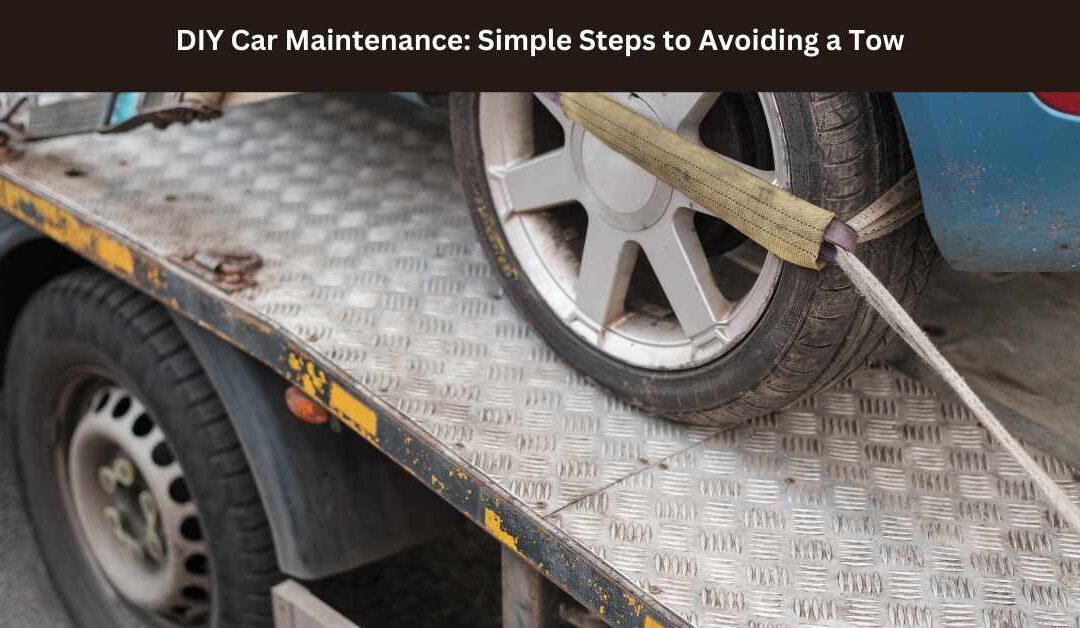Breaking down on the road is an inconvenience no driver wants to face. While towing services are essential in emergencies, proactive car maintenance can significantly reduce the chances of needing one. By performing simple DIY checks and upkeep, you can keep your vehicle in top shape and ensure smooth journeys. Here’s a guide to essential car maintenance tasks that can help you avoid unexpected breakdowns and tows.
1. Check Your Tires Regularly
Worn or underinflated tires are among the leading causes of roadside emergencies. To avoid issues:
- Inspect Tread Depth: Use a tread depth gauge or the penny test to ensure your tires have enough grip.
- Check Tire Pressure: Use a tire pressure gauge to maintain levels recommended in your owner’s manual. Improper pressure can lead to blowouts or reduced fuel efficiency.
- Rotate Tires: Rotating tires every 5,000–7,000 miles ensures even wear and extends their lifespan.
2. Monitor Fluid Levels
Fluids keep your car running efficiently. Low or dirty fluids can lead to breakdowns, so check these regularly:
- Engine Oil: Use the dipstick to ensure the oil level is adequate and change it as per your car’s maintenance schedule.
- Coolant: Inspect coolant levels to prevent overheating.
- Brake Fluid: Check that it’s at the proper level and free from contaminants.
- Transmission Fluid: Low levels can lead to gear issues.
- Windshield Washer Fluid: While not critical, it ensures visibility during adverse conditions.
3. Inspect the Battery
A dead battery is a common reason for tow truck calls. To keep your battery in good condition:
- Clean Terminals: Remove corrosion with a mix of baking soda and water.
- Check Voltage: Use a multimeter to ensure the battery is holding a charge.
- Secure Connections: Ensure terminals are tight and cables are free from fraying.
Replace When Necessary: Most car batteries last 3–5 years. Replace yours if it’s nearing the end of its lifespan.
4. Maintain the Braking System
Faulty brakes can be dangerous and lead to mechanical failures. Keep them in top shape by:
- Listening for unusual noises like squealing or grinding.
- Checking brake pads and rotors for wear.
- Flushing brake fluid as recommended by your vehicle’s manual.
5. Replace Belts and Hoses
Broken belts and leaking hoses can leave you stranded. Inspect them for:
- Cracks or Fraying: Replace any that look worn.
- Leaks: Look for fluid around hoses, which could indicate a problem.
- Tightness: Ensure belts are properly tensioned.
6. Pay Attention to Warning Lights
Modern cars are equipped with sensors that alert you to potential issues. Don’t ignore dashboard warning lights, such as:
- Check Engine Light: Indicates a range of issues, from minor to serious.
- Battery Light: Signals charging system problems.
- Temperature Light: Suggests the engine is overheating.
- Address these warnings promptly to prevent breakdowns.
7. Replace Worn Wiper Blades
While wiper blades don’t directly affect engine performance, poor visibility can lead to accidents. Replace them every 6–12 months or sooner if they leave streaks.
8. Keep Your Gas Tank Full
Running out of fuel is a surprisingly common reason for tows. Avoid this by:
- Refueling when your tank is at a quarter full.
- Keeping an eye on your fuel gauge during long trips.
9. Perform Regular Inspections
Walk around your car regularly to check for:
- Exterior Damage: Cracks in headlights, taillights, or mirrors.
- Fluid Leaks: Puddles under your car may indicate a problem.
- Loose Parts: Ensure nothing is hanging or dragging.
10. Pack an Emergency Kit
Even with the best maintenance practices, unexpected issues can arise. Having an emergency kit can make a difference:
- Jumper cables
- Tire repair kit
- Portable air compressor
- Flashlight and batteries
- Basic tools (wrenches, screwdrivers, etc.)
Conclusion
Routine DIY car maintenance is simple, cost-effective, and can prevent the frustration of unexpected breakdowns and tows. By staying proactive with these basic tasks, you not only save money on towing and repairs but also ensure the safety and reliability of your vehicle. Take the time to care for your car today, and it’ll take care of you on the road.


Recent Comments